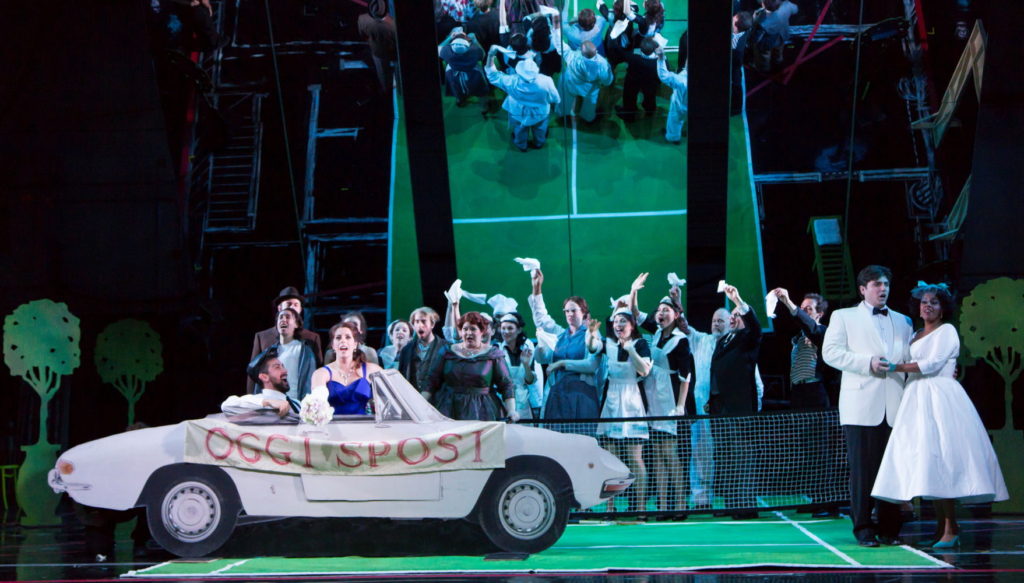
Photo: T. Charles Erickson
Presented by Boston Lyric Opera
Music by Wolfgang Amadeus Mozart
Libretto by Lorenzo da Ponte
Conducted by David Angus
Directed by Rosetta Cucci
April 28th – May 7th, 2017
John Hancock Hall
Back Bay Events Center
180 Berkley Street
Boston, MA 02116
BLO on Facebook
Review by Gillian Daniels
(Boston, MA) A 1950’s-style screwball comedy proves its compatibility with a comic opera from 1786 in this brilliant production. It’s layered, creating the idea of a show-within-a-show as stage hands help along the action, feeling like Kiss Me Kate with Mozart as source material rather than Shakespeare. With the help of charming, self-aware direction from Rosetta Cucchi and conductor David Angus, the story of two servants who outwit the wandering eye of a less-than-noble nobleman feels universal, familiar, and luminescent.
Figaro (Evan Hughes) is not just a valet but a chauffeur with a white, neatly-kept car in a mid-twentieth century villa in Italy. He prepares to marry the playful Susanna (the brilliant Emily Birsan), who informs him that their boss, Count Amaviva (a wonderfully cruel turn by David Pershall), has been making unwelcome, flirtatious overtures toward her. They spend the opera learning how to outwit him from his lust for Susanna and drive him back into the arms of Countess Almaviva (Nicole Heaston, gracefully dolled up like a golden age movie star with far better pipes).
Rounding out this stellar core cast is the young, stud-ly, and frivolously romantic Cherubino, played by Emily Fons. She nails the swagger of a mooning, guitar-swinging frat boy with too much affection to give and a penchant for trouble. Her scenes with Susanna, in which Cherubino sings over Countess Almaviva, are warm and funny. Watching the Countess and Susanna laugh as they dress up Cherubino in ill-fitting feminine garments to trick the Count, is also a delight.
I’d say the time is right for a story about a powerful, perverted man getting comeuppance for chasing women outside of wedlock, but when is it not that time? The story has threads of bawdiness that stage director Cucci intertwines smartly, sidestepping gross sexism for a story of triumph over the ego of the philandering Count. That this antagonist doesn’t have the full wrath visited on him he really deserves is my own quibble, one that doesn’t line up with the conventions of both romantic comedies in Hays Code Hollywood and operas written to be consumed by the very rich that would have been the fictional Count’s contemporaries. I might as well fight the ridiculousness of the wild, convenient coincidences that drive the plot.
The Marriage of Figaro shows its age only during the second half, where the action is drawn out to avoid the inevitable peaceful accord between all couples. This is a comedy; of course it ends in marriage and happiness.
Until the last scene, there’s nothing but inventive fun to be had. An extra layer of pleasure involves the “stage hands” running around in t-shirts emblazoned with “FIGARO.” They conceal, deride, and push the actors forward when necessary, openly appearing to enjoy the show as much as the audience. They’re entertaining avatars, starting the opera interrupted in the middle of a card game and ending it in thrall of the action on stage.
Kudos to set designed Jon Conklin for adding giant mirrors to the back of the stage, making the space feel unique and expansive.
It’s hard not to fall hard for the Boston Lyric Opera’s confection of a show. In the 18th century, Lorenzo Da Ponte, who also noted the length of the show, deemed it a “new kind of spectacle” in his preface to the first published version of the libretto. (Thank you, Wikipedia.) I’ll add that it’s also the sort of spectacle that can be reinvented through the centuries, one layered in the age-old, dire troubles of infidelity, lordship, and loyalty, but, given the right direction, all the weight of a breezy movie musical.
